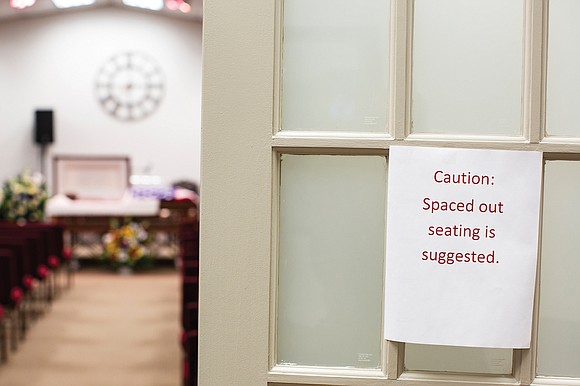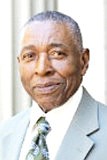COVID-19 changes funeral traditions
Brian Palmer | 4/2/2020, 6 p.m. | Updated on 4/28/2020, 10:04 a.m.

COVID-19 has taken thousands of lives and upended business as usual around the world during the past few months. Just as the pandemic is changing daily life for millions, it is rapidly changing how the living lay their loved ones to rest.
In Henrico County, Wilson & Associates’ Funeral Service on Nine Mile Road held a walk-through viewing this week for the late Robert W. Peay, an emeritus faculty member at Virginia Commonwealth University’s School of Social Work. Visitors came in ones and twos on Monday afternoon. As one man exited, another entered. He was a classmate of Mr. Peay’s, he said.
Daryl V. Fraser, a colleague of Mr. Peay, sat in the front row across from the casket inside the chapel for a few minutes.
“He was a good man, a family man. A father figure. He had a profound impact on who I am as a social worker,” said Mr. Fraser, who was alone until an older couple came in. The three remained at least 6 feet apart during the viewing as coronavirus protocol demands.
“We have what’s called a viewing and you have what’s called a visitation,” Brian V. Wilson, owner of the funeral home, explained.
A standard viewing, he said, is “coming in and going out.” People pay their respects at the casket, linger for a few moments and then leave.
At a visitation, family and friends sit, socialize and celebrate the life of the person who has passed away.
But Gov. Ralph S. Northam’s Executive Order 53 has put an end to large visitations — and to funerals as well. The directive prohibits gatherings of 10 or more people.
“The governor’s order does not reference or create an exception for funeral gatherings,” the Virginia Department of Health Professions, which regulates embalmers and funeral homes, noted in an electronic posting for funeral directors.
Mr. Wilson now limits the number of people allowed in the funeral home’s viewing room to four at a time. He also has set a 10-minute time limit.
“A lot of our families understand. They’ve taken it pretty good,” Mr. Wilson said. But for people who are “already grieving, this adds another layer of stress.”
Other area funeral homes also are following the governor’s order.
“The traditional funeral has changed quite a bit,” said Richard A. Lambert Sr., owner and president of Scott’s Funeral Home in North Side. “It’s a frightening situation and we have to treat this a little different.”
For families, “it’s hard to adjust to the fact that they have to have a limited number of people at the funeral and they have to have a closed casket, and they can’t even go to the gravesite,” Mr. Lambert said.
Many cemeteries, he noted, are bound by the governor’s order as well and are limiting the number of people allowed at burials. As a result, more families are opting for cremation, he said.
“It’s tough, and I really feel for the families,” said Joseph Jenkins III, vice president and manager of Joseph Jenkins Jr. Funeral Home in the West End. “Some people are choosing to have a memorial service at a later date.”
COVID-19 also has huge implications for how the professionals who actually handle remains work. The Centers for Disease Control and Prevention issued guidelines for handling bodies of those who die from the virus.
“A funeral or visitation service can be held for a person who has died of COVID-19.
Funeral home workers should follow their routine infection prevention and control precautions when handling a decedent who died of COVID-19,” the guidance stated.
The CDC also offers some science-based reassurance to death care professionals and people attending funerals.
“There is currently no known risk associated with being in the same room at a funeral or visitation service with the body of someone who died of COVID-19.”
Still, according to the CDC guideline, “people should consider not touching the body of someone who has died of COVID-19. Older people and people of all ages with severe underlying health conditions are at higher risk of developing serious COVID-19 illness.”
Handling the bodies of people with infectious diseases is nothing new for funeral directors. Disease transmission and control and sterilization are mandatory subjects in mortuary science school, which funeral service providers must attend in order to obtain a license in the Commonwealth. In fact, it’s against the Virginia law for a funeral director to refuse to accept the body of person who has died of an infectious disease.
“Standard protocol is to treat every case as if they have something, an infectious disease,”
Mr. Wilson said. But funeral home workers who handle the deceased in the time of COVID- 19 take additional measures, he said, such as wearing two pairs of gloves and double gowns and shoe covers.
During this crisis, more funeral business has necessarily — and swiftly — moved online.
Chavelá D. Painter, a Newport News funeral director and president of the Virginia Morticians Association, an organization of African-American death care professionals, said face-to-face meetings with VMA members are now virtual.
“We have been connecting on the regular with each other, on conference calls or via Zoom, in order to stay connected and to discuss what is going on as far as COVID-19.”
And if local funeral directors weren’t live-streaming services already, they are now.
The African-American funeral is social, said Mr. Jenkins, and so, too, is the African-American funeral home. He laments having to cancel the post-funeral repast, a staple of a traditional black funeral. But he also misses the affectionate physical contact that’s customary.
“The first thing we do when we meet a family — whether they’re a family we’ve served or a new family — we shake hands, we hug,” Mr. Jenkins said.
But not anymore, he added.
“That’s just one of the millions of reasons why I’m praying for this to be over.”








